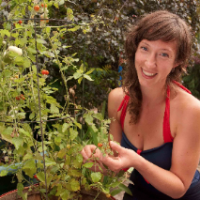Kate Leinweber, B.Sc R.H.N
The Difference Between East & West.
I’m from Vancouver.
The center of all things healthy, beautiful and Organic. I was used to all things natural, certified organic and perfect for my consumption. I spent an outrageous amount of money on food and jumped on many health bandwagons; vegetarianism, veganism, raw foodism. In my fridge you would always find kale, bee pollen, spirulina, chlorella, hemp seeds, freshly ground flax seeds, aloe vera, bentonite clay and of course the vitamix with leftover green smoothie.
In Vancouver, land of Whole Foods, Choices and other big name stores, where the connection between consumer and store owner is broken, the only way to know that a food is “healthy” is to have a middle man, pay a lot of money, and get a “Certified Organic” label. Oh how Humans love labels. And Oh how Vancouver doesn’t like to really talk about things. It’s easier to look pretty and find a label to prove something is perfect. It’s a passive approach.
(Of course there is an underground group of very active urban gorilla farmers in the East End of Vancouver that are doing an amazing job of bringing naturally grown traditional foods to farmers markets. My lawyer by day, biodynamic farmer by night great friend Johanna makes sure I’m kept informed of this. But I lived on the west side for 13 years so my perceptions are skewed.)
Then I moved to Toronto.
The land of Healthy Skepticism. On my first few shopping trips I was appalled at how difficult it was to find Certified Organic produce, dairy, and meats. Do these people not even care about their health? And how is there only one Whole Foods for this whole city? I was forced out of my Vancouverite bubble, and started talking to shop owners. I learned that here in Ontario, shop owners have a relationship with the farmers that supply their food. I could find out what was used to grow vegetables, what animals were fed, how they were treated etc. Torontonians find out where their food comes from through simple communication instead of the complex process of the certified organic system.
Now I will finally get into simple recommendations to answer the question:
Do I Need to Buy Organic?
Buying Certified Organic foods ensures that pesticides were not used, that sustainable farming practices were employed, and that animals were fed organic feed and treated humanely.
Certified organic food comes with a large price tag since the farmers have to pay for the certification process. By shopping locally at farmers markets and smaller businesses you can ask where your food came from and how it was grown/raised. This way you can find foods that have been produced according to sustainable organics practices even if they are not “certified”.
Pesticides are fat soluble which means they build up in meats and dairy products. So buy your meat and dairy Organic. Conventional produce can be peeled or washed in some soapy water or apple cider vinegar to remove the majority of pesticides.
Can’t find pesticide free fruits and veggies? Fill up your sink and add some soap or vinegar. Let them soak for 20 minutes and rinse thoroughly. This will dramatically reduce the pesticide content.
~
Editor: Kate Bartolotta.











Read 13 comments and reply